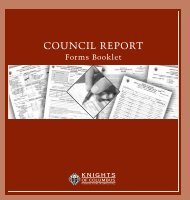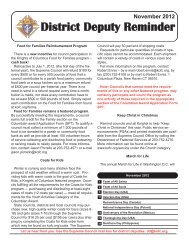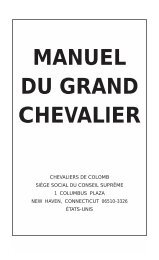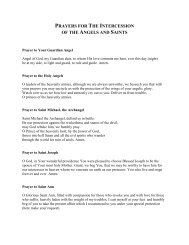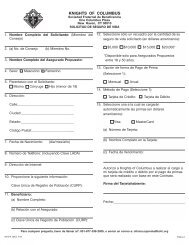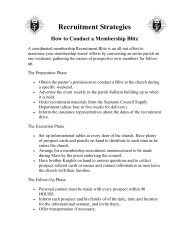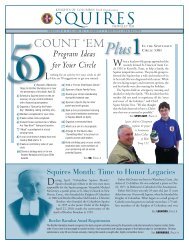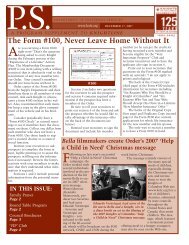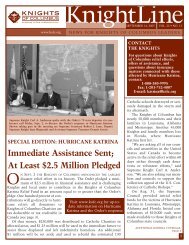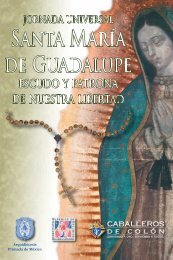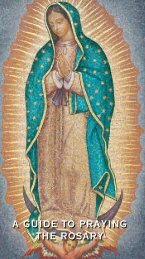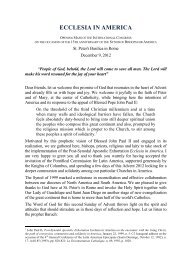CATHOLIC WORD BOOK - Knights of Columbus, Supreme Council
CATHOLIC WORD BOOK - Knights of Columbus, Supreme Council
CATHOLIC WORD BOOK - Knights of Columbus, Supreme Council
Create successful ePaper yourself
Turn your PDF publications into a flip-book with our unique Google optimized e-Paper software.
<strong>of</strong> economics and social organization, were<br />
stated about the middle <strong>of</strong> the 19th<br />
century by Karl Marx, author <strong>of</strong> The<br />
Communist Manifesto and, with Friedrich<br />
Engels, Das Kapital. The elements <strong>of</strong><br />
communist theory include: radical<br />
materialism; dialectical determinism; the<br />
inevitability <strong>of</strong> class struggle and conflict,<br />
which is to be furthered for the ultimate<br />
establishment <strong>of</strong> a worldwide, classless<br />
society; common ownership <strong>of</strong> productive<br />
and other goods; the subordination <strong>of</strong> all<br />
persons and institutions to the<br />
dictatorship <strong>of</strong> the collective; denial <strong>of</strong> the<br />
rights, dignity and liberty <strong>of</strong> persons;<br />
militant atheism and hostility to religion,<br />
utilitarian morality. Communism in<br />
theory and practice has been the subject <strong>of</strong><br />
many papal documents and statements.<br />
Pius IX condemned it in 1846. Leo XIII<br />
dealt with it at length in the encyclical<br />
letter Quod Apostolici Muneris in 1878 and<br />
Rerum Novarum in 1891. Pius XI wrote on<br />
the same subject in the encyclicals<br />
Quadragesimo Anno in 1931 and Divini<br />
Redemptoris in 1937. These writings have<br />
been updated and developed in new<br />
directions by Pius XII, John XXIII, Paul<br />
VI and John Paul II.<br />
Compline: The night prayer <strong>of</strong> the Church<br />
that completes the daily cursus (course) <strong>of</strong><br />
the Liturgy <strong>of</strong> the Hours (Divine Office).<br />
Concelebration: The liturgical act in which<br />
several priests, led by one member <strong>of</strong> the<br />
group, <strong>of</strong>fer Mass together, all<br />
consecrating the bread and wine.<br />
Concelebration has always been common<br />
in churches <strong>of</strong> Eastern Rite. In the Roman<br />
Rite, it was long restricted, taking place<br />
only at the ordination <strong>of</strong> bishops and the<br />
ordination <strong>of</strong> priests. The Constitution on<br />
-20-<br />
the Sacred Liturgy issued by the Second<br />
Vatican <strong>Council</strong> set new norms for<br />
concelebration, which is now relatively<br />
common in the Roman Rite.<br />
Concordance, Biblical: An alphabetical<br />
verbal index enabling a user knowing one<br />
or more words <strong>of</strong> a scriptural passage to<br />
locate the entire text.<br />
Concordat: A church state treaty with the<br />
force <strong>of</strong> law concerning matters <strong>of</strong> mutual<br />
concern — e.g., rights <strong>of</strong> the Church,<br />
arrangement <strong>of</strong> ecclesiastical jurisdictions,<br />
marriage laws, education. Approximately<br />
150 agreements <strong>of</strong> this kind have been<br />
negotiated since the Concordat <strong>of</strong> Worms<br />
in 1122.<br />
Concupiscence: Any tendency <strong>of</strong> the<br />
sensitive appetite. The term is most<br />
frequently used in reference to desires and<br />
tendencies for sinful sense pleasure.<br />
Confession: Sacramental confession is the<br />
act by which a person tells or confesses his<br />
sins to a priest who is authorized to give<br />
absolution in the sacrament <strong>of</strong> penance.<br />
Confessor: A priest who administers the<br />
sacrament <strong>of</strong> penance. The title <strong>of</strong><br />
confessor, formerly given to a category <strong>of</strong><br />
male saints, was suppressed with<br />
publication <strong>of</strong> the calendar reform <strong>of</strong> 1969.<br />
Confraternity: An association whose<br />
members practice a particular form <strong>of</strong><br />
religious devotion and/or are engaged in<br />
some kind <strong>of</strong> apostolic work.<br />
Congregation: (1) The collective name for<br />
the people who form a parish. (2) One <strong>of</strong><br />
the chief administrative departments <strong>of</strong>



